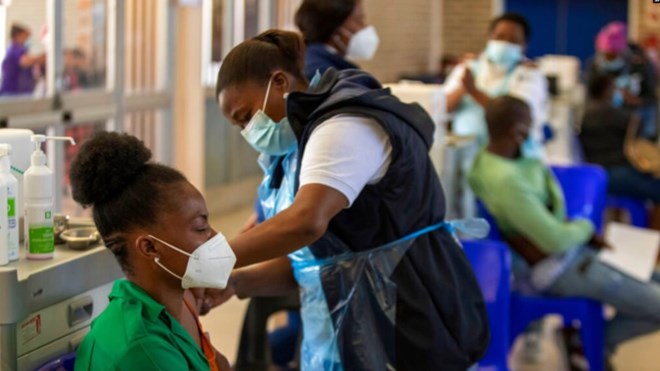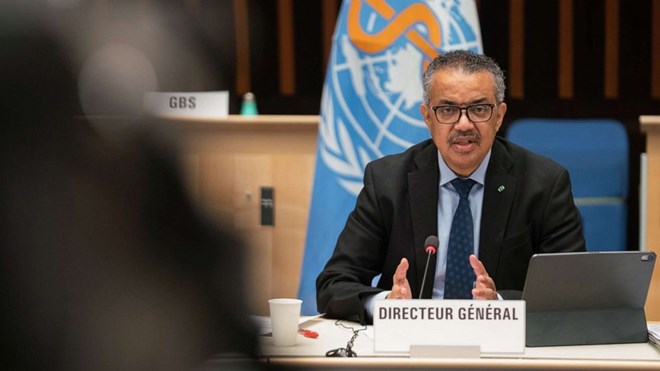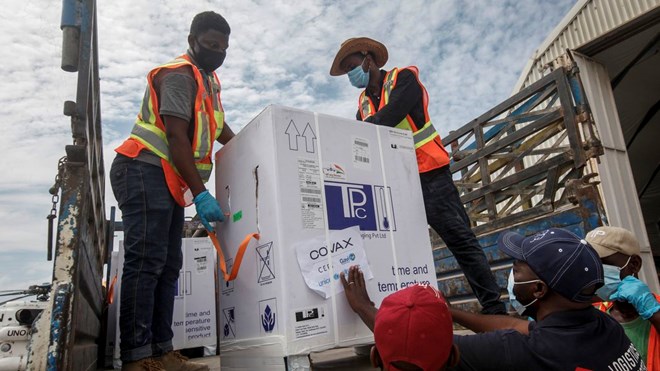
Tuesday April 13, 2021

A professional paramedic receives a dose of Johnson & Johnson COVID-19 vaccine from a health staff member at a vaccination center at Chris Hani Baragwanath Academic Hospital in Johannesburg, South Africa, March 26, 2021.
Africa is lagging in vaccinating its people against the COVID-19 disease, and continental heads of state and international health officials say vaccine manufacturing must come to Africa in earnest to combat both the illness and future health emergencies.
These experts, alongside African heads of state and international finance figures, are meeting virtually this week to hash out an ambitious plan to bring more manufacturing capability to the continent. South Africa only recently started to make the COVID-19 vaccine, but is the main producer on the continent.
While Africa has reported a relatively low number of cases compared to other regions, it has seen the world's slowest rollout of vaccination campaigns.
One-quarter of the world's vaccines has gone into the arms of Americans. The developing world has been far less fortunate, according to Tedros Adhanom Ghebreyesus, the director-general of the World Health Organization.
"There remains a shocking imbalance in the global distribution of vaccines, as I have said many times," he said. "More than 700 million vaccine doses have been administered globally, but over 87 percent have gone to high-income or upper-middle-income countries, while low-income countries have received just 0.2 percent. The pandemic has shown that global manufacturing capacity and supply chains are not sufficient to deliver vaccines and other essential health products quickly and equitably to where they are needed most. That's why building up vaccine manufacturing capacity in Africa is so important."

FILE - Tedros Adhanom Ghebreyesus, director-general of the World Health Organization, speaks in Geneva, Jan. 21, 2021.
John Nkengasong, director of the Africa Centers for Disease Control and Prevention, said the continent — which is home to nearly 1.3 billion people — has just a handful of vaccine manufacturing and that 99 percent of vaccines are imported. He praised African leaders, notably South African President Cyril Rampahopsa, for fighting for institutions like the COVAX facility and the African Union's vaccine acquisition task force, to make sure that African nations get a fair share of the foreign-manufactured shots.
COVAX is a global initiative set up to ensure that poorer nations aren't left out of the worldwide scramble for vaccine access.
Economist Vera Songwe, executive secretary of the United Nations Economic Commission for Africa, estimated that the pandemic has caused 100 million Africans to fall into poverty, and led to the loss of 30 million jobs. If the continent can seize on medical manufacturing, she predicted 6 million jobs can be created.
However, she said the continent shouldn't stop there.
"We have about 80 different variables that get into the vaccine production," she said. "So yes, Africa should produce vaccine, but the whole vaccine supply chain — syringes, plastics, containers for the vaccines — also can and should be produced on the continent. This is the very essence of the African continental free trade area agreement, as we build global supply chains and regional supply chains that allow us to do this. So let us not only focus on vaccine production itself; we must focus on all the other inputs into the vaccine production supply chain."

FILE - Boxes of AstraZeneca COVID-19 vaccine manufactured by the Serum Institute of India and provided through the global COVAX initiative arrive at the airport in Mogadishu, Somalia, March 15, 2021.
Although experts are still hashing out how to do this, there is one thing they seem to agree on: It won't be quick or cheap. To that end, Songwe said, the African continent is asking for 25 percent of the International Monetary Fund's international reserve asset, a fund that gives countries access to major currency reserves. That's a far larger share than that program allocates to the continent.
Ngozi Okonjo-Iweala, who last month became the first African and the first woman to head the World Trade Organization, said a plan to manufacture vaccines in Africa requires much more than time, care and money. It requires changes to intellectual property laws, trade agreements, transport networks, research capabilities and more.
Having stepped into her new job amid the economic and social devastation of this pandemic, Okonjo-Iweala said she's determined to prepare for the next disaster, not just because it's the right thing to do, but because it makes fiscal sense.
"We were not prepared for this pandemic globally," she said. "Spending billions of dollars for preparedness would have saved us trillions of dollars in response. The world is now learning how to do this better for the next time, and putting in place a framework to manage the next pandemic. Africa must also prepare and think of how to do better for future crises."